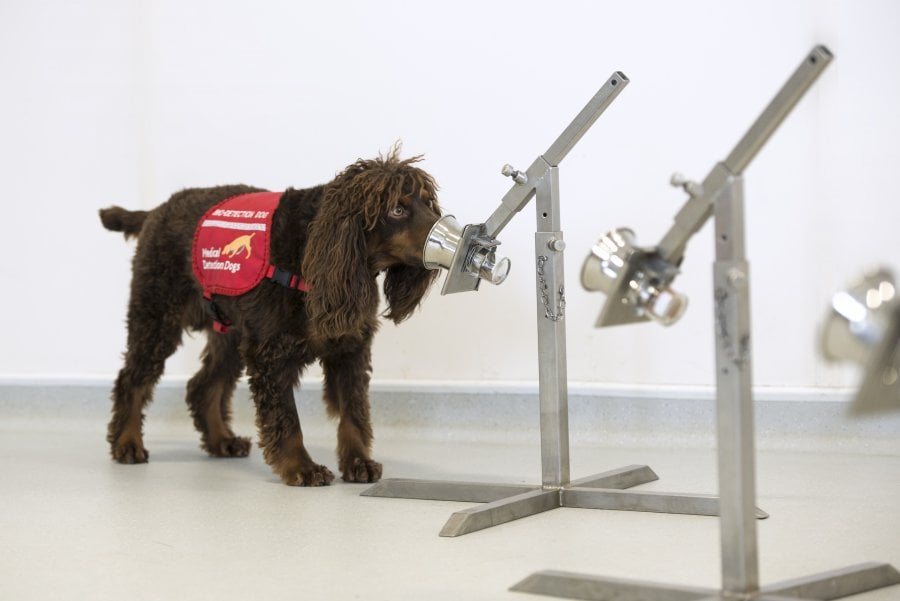UK Government supports COVID-19 detection dogs trial
15 May 2020 London School of Hygiene & Tropical Medicine London School of Hygiene & Tropical Medicine https://lshtm.ac.uk/themes/custom/lshtm/images/lshtm-logo-black.png
In the first phase of the trial, world-leading disease control experts from the London School of Hygiene & Tropical Medicine (LSHTM), in collaboration with Medical Detection Dogs and Durham University, aim to determine whether dogs are able to detect coronavirus in humans from odour samples.
This team have previously worked together to demonstrate that dogs can detect odours from humans with a malaria infection with extremely high accuracy – above the World Health Organization standards for diagnostic.
This new trial will look at whether dogs can be trained to detect coronavirus, even if people are asymptomatic.
If the trial gathers sufficient evidence, the first set of dogs could be deployed to key points of entry into the UK within six months to assist with the rapid screening of people travelling from abroad.
If successful, these dogs could provide a fast and non-invasive detection method alongside the Government’s robust five-pillar testing strategy, potentially screening up to 250 people per hour each. It is one of a number of testing measures being explored in order to ensure the Government’s response to the virus is as extensive as possible.
Professor James Logan, lead researcher for the work and Head of the Department of Disease Control at LSHTM, said:
“Our previous work has shown that malaria has a distinctive odour, and with Medical Detection Dogs, we successfully trained dogs to accurately detect malaria. This, combined with the knowledge that respiratory disease can change body odour, makes us hopeful that the dogs can also detect COVID-19.
“I would like to thank the UK government for their support of this pioneering research through this funding. We’re excited to do this trial, and confirm whether these bio detection dogs can be used to screen for COVID-19 at ports of entry such as airports.
“If successful, this approach could revolutionise how we diagnose the virus, leading to the rapid screening of high numbers of people, which could be profoundly impactful and help get our lives back to some sort of normality.”
The initial phase of the trial will see the collection of samples from NHS staff in London hospitals, following which six bio detection dogs, a mixture of Labradors and Cocker Spaniels, will undergo thorough training.
Minister for Innovation Lord Bethell said:
“Bio-detection dogs already detec specific cancers and we believe this innovation might provide speedy results as part of our wider testing strategy.
“Accuracy is essential so this trial will tell us whether ‘covid dogs’ can reliably detect the virus and stop it spreading.”
Dr Claire Guest, Co-Founder and CEO of Medical Detection Dogs said:
“We are delighted that the government has given us the opportunity to demonstrate that dogs can play a role in the fight against COVID-19. They have the potential to help by quickly screening people, which will be vital as the country moves out of lockdown. Hopefully this will prevent a second peak and enable precious NHS resources to be used where most needed.
“We have already demonstrated our expertise in canine disease detection by successfully training dogs to detect diseases like cancer, Parkinson’s and malaria, and we apply that same science to train life-saving Medical Alert Assistance Dogs to detect odour changes in individuals caused by their health condition.
“We are sure our dogs will be able to find the odour of COVID-19 and we will then move into a second phase to test them in live situations, following which we hope to work with other agencies to train more dogs for deployment. We are incredibly proud that a dog’s nose could once again save many lives.”
More than ten years of research by Medical Detection Dogs has shown that dogs can be trained to detect the odour of disease at the equivalent dilution of one teaspoon of sugar in two Olympic-sized swimming pools of water.
The dogs will only be deployed if backed by strong scientific evidence and is part of the Government’s approach to explore all possible options to tackle coronavirus.
The team is in constant contact with scientists and veterinarians to confirm the latest understandings, however it is currently believed that this is completely safe for dogs to perform this duty. Scientists have found that although COVID-19 is a novel virus that originated from animals and was passed on to humans, dogs cannot contract the disease. The dogs will be trained on non-infectious samples and will not need to make contact with the individuals they are screening.
Professor Steve Lindsay, from the Department of Biosciences at Durham University, said:
“We’re absolutely delighted to be awarded this funding so we can start this important research.
“If we can show that our trained dogs can identify people carrying the virus, but who are not sick, it will be a game changer. We will then be able to scale-up the use of dogs at ports of entry to identify travellers entering the country with the virus. This will be important to prevent a second wave of the epidemic.”
LSHTM's short courses provide opportunities to study specialised topics across a broad range of public and global health fields. From AMR to vaccines, travel medicine to clinical trials, and modelling to malaria, refresh your skills and join one of our short courses today.